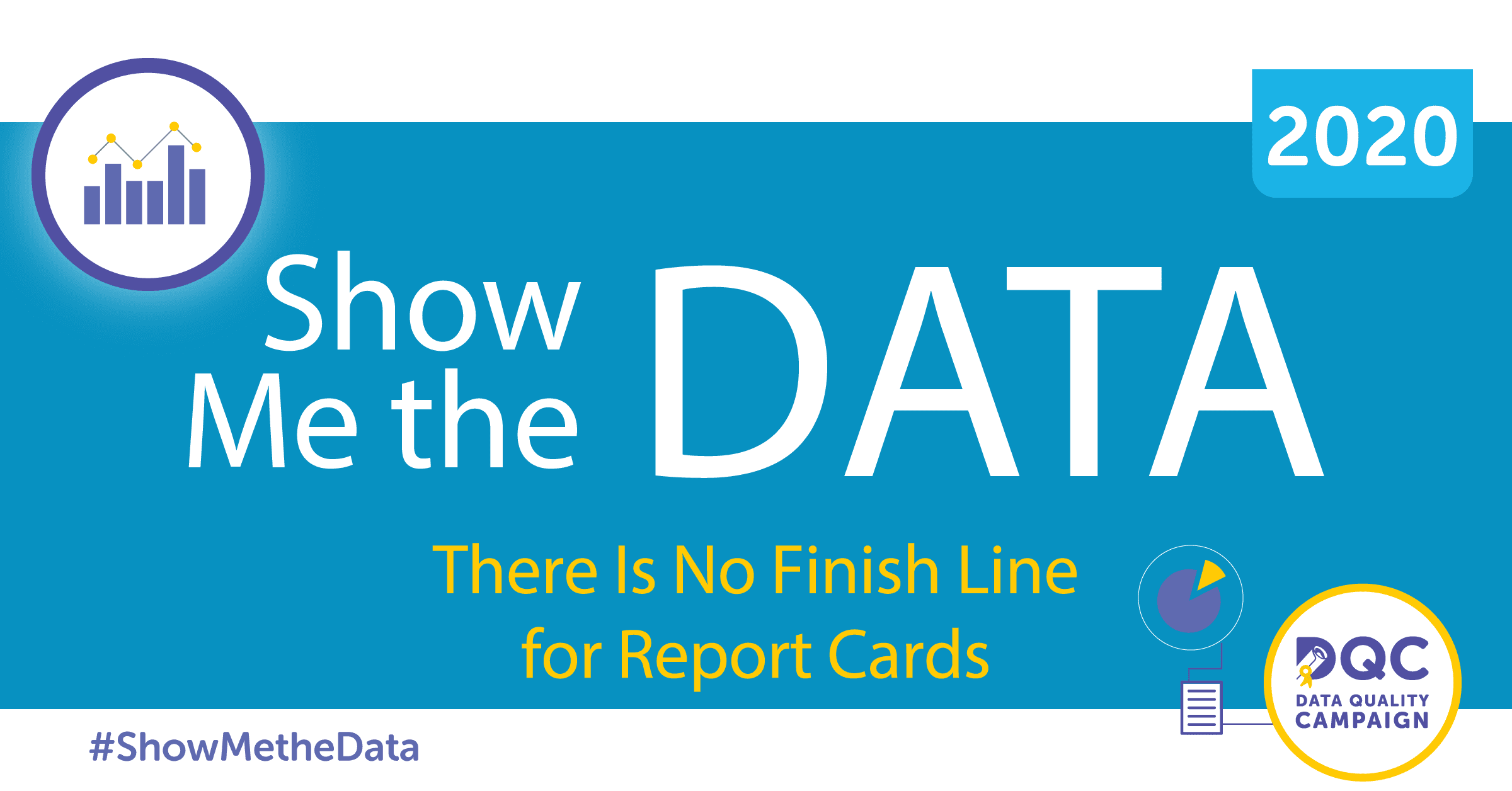Data Quality Campaign finds that more states’ report cards include information that families need, but there is still work to do
WASHINGTON (October 21, 2020) – Leaders must prioritize publishing the information that families and communities need and deserve on their report cards. And there is no finish line for this work. State leaders must continuously evaluate whether the tool they have created is meeting the needs of their audiences and providing clear, understandable information about school quality and student progress. The Data Quality Campaign’s (DQC) 2020 Show Me the Data report highlights the progress states have made to provide meaningful, easy-to-understand information to families through their report cards and the areas where leaders still have more work to do.
“Parents and communities have always needed information to support their students,” said DQC President and CEO Jennifer Bell-Ellwanger. “State leaders must provide not only the required data on their report cards, but also useful information to give families a fuller picture of whether schools are supporting all groups of students and what supports are needed to ensure that students succeed. As state and district leaders work to recover from the COVID-19 pandemic, families and communities deserve this data more than ever.”
This is DQC’s fourth year conducting a comprehensive landscape review of state report cards from all 50 states and the District of Columbia. As the pandemic began and leaders nationwide were rightfully focused elsewhere, DQC made the decision to postpone the release of this year’s review, which was conducted in January 2020.
“Our review captures a moment in time. We’ve heard from some states that they’ve added data to their report cards since our review period this year and we’re encouraged that states have been continuing to improve their report cards,” said Bell-Ellwanger. “As a state’s most public-facing resource, improving report cards is an evolving process, and states need to continuously ensure that report cards meet the needs of their communities. States must work from this important baseline next year.”
State report cards must be driven by a clear theory of change, and DQC’s review saw leaders taking one of two approaches with their report cards: making required data available or providing meaningful transparency that informs families and communities. States that prioritize making required data available focus on how complete the data is, whether it is high quality, and how easy it is to locate. States that prioritize providing meaningful transparency that informs families and communities continuously improve their report cards, ensure that the language on their report cards is easy to understand, and provide helpful context for the data being presented so families and communities understand the value and meaning of the information.
DQC’s annual report card review uncovered the following positive trends:
- 43 states report student growth data on their report cards this year, up from 39 the previous year.
- 35 states include postsecondary enrollment data, up from 24 the previous year.
- 25 states include career and technical education enrollment or completion data, up from 16 the previous year.
- 13 states include teacher demographic data, up from 11 the previous year.
The 2020 Show Me the Data report includes the following state bright spots as examples that other states can learn from:
- Delaware built on the federal requirement to make per-pupil expenditure data more useable for families and communities by focusing on user needs.
- Minnesota and Washington made the language on their report cards easy to understand.
- Idaho, Illinois, and Oklahoma provided context to make the information more meaningful.
- Rhode Island created charts and graphs specifically designed for mobile use, helping ensure equitable access to the critical information families and communities need to understand how their children are being served.
- Ohio state legislation requires that data related to school and district performance be reported publicly, even though accountability ratings will not be calculated for the year—showing that state leaders have committed to transparency and the importance of data for planning and best serving Ohio students during the upcoming school year.
However, state leaders should prioritize improving their report cards in the following ways:
- 26 states are still missing at least one required student group in their displays of disaggregated student achievement data—although this number is a significant decrease from previous years.
- While every state includes graduation rate data, 25 states do not include that information broken out by all of the federally required student groups.
- 25 states do not include all the required information about teacher experiences, such as information about whether teachers are inexperienced or do not have required credentials.
- Just 25 states provide the option to translate their report card into a language other than English.
- While most states publish per-pupil expenditure data, the majority of states are still working to fulfill the new requirement in ways that are meaningful and actionable to communities.
DQC’s updated scavenger hunt—which now includes questions about school spending data—can be used to examine state report cards. Users should follow the steps to identify which information is currently included on a state’s report card.
View the full Show Me the Data 2020 report here.
DQC staff reviewed states’ report cards across all 50 states and the District of Columbia as of January 2020. The review was conducted on report cards found through links provided by states or an internet search—and was limited to information contained within the report card, not on outside resources or links. The full spreadsheet of findings can be found here.
###
Contact: Blair Mann, bmann@dataqualitycampaign.org, 610-724-5914
About the Data Quality Campaign
The Data Quality Campaign is a nonprofit policy and advocacy organization leading the effort to bring every part of the education community together to empower educators, families, and policymakers with quality information to make decisions that ensure that students excel. For more information, go to dataqualitycampaign.org and follow us on Facebook and Twitter (@EdDataCampaign).


